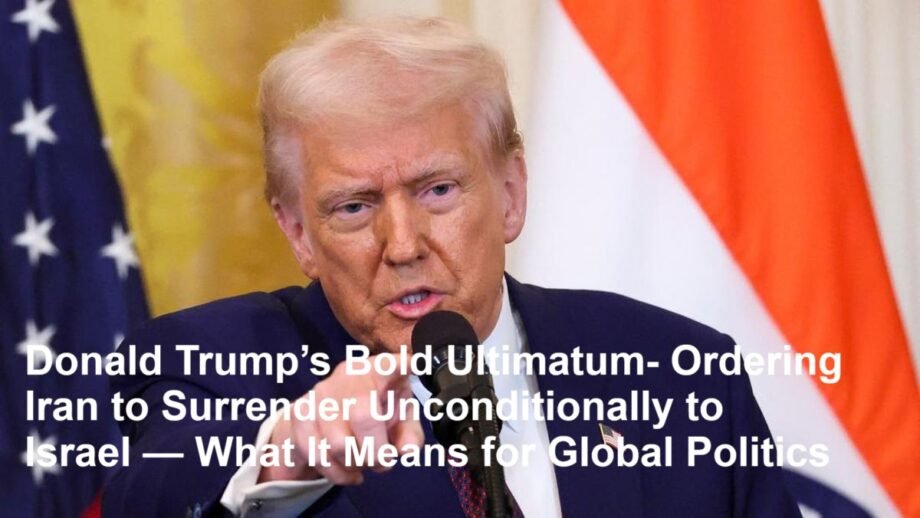Introduction
In a dramatic development that has captured global attention, former U.S. President Donald Trump reportedly issued a stark order demanding Iran to surrender unconditionally to Israel. This strong declaration carries significant geopolitical implications, raising tensions in the already volatile Middle East region. Understanding this statement, the context behind it, and its potential consequences is essential for anyone tracking international relations, security, and diplomacy.
Background on U.S., Israel, and Iran Relations
The relationship between the United States, Israel, and Iran has been complex and often confrontational for decades. The U.S. has historically been a staunch ally of Israel, while Iran has been viewed as a regional adversary due to its nuclear ambitions and support for proxy groups opposing Israeli interests.
Donald Trump’s administration showed a particularly aggressive stance towards Iran, withdrawing from the historic 2015 Iran nuclear deal (JCPOA) and implementing strict sanctions aimed at curbing Iran’s nuclear program. This latest order for Iran’s unconditional surrender marks an escalation in rhetoric that continues to polarize global stakeholders.
What Does “Unconditional Surrender” Mean?
The term “unconditional surrender” is powerful and uncompromising, implying that Iran must relinquish all resistance and agree to Israeli terms without negotiation or conditions. Such a demand would likely include:
- Complete cessation of all military activities against Israel.
- Halting Iran’s nuclear development programs.
- Possibly stepping back from supporting militias and proxy forces hostile to Israel.
This wording signals a zero-tolerance policy and sets a high bar for diplomatic engagement, potentially increasing the risk of military confrontation.
Potential Impact on Regional Stability
The statement by Donald Trump reverberates through the Middle East, igniting fears of escalating violence. Key risks include:
- Heightening tensions between Iran and Israel, which have already clashed indirectly through proxy conflicts in Syria, Lebanon, and Gaza.
- Provoking allies of Iran, such as Russia and North Korea, to potentially support Iran militarily or politically.
- Influencing other global powers like China and the European Union to respond diplomatically or economically.
This tense atmosphere could destabilize the region further and provoke wider geopolitical consequences, possibly even drawing in superpowers in a larger crisis.
Analysis of Motivations Behind Trump’s Declaration
For Trump supporters, this bold ultimatum is seen as a display of strength and decisive leadership in defending Israel, a key ally. It may also be intended to:
- Strengthen Trump’s political influence on U.S. foreign policy from outside office.
- Pressure Iran by sending a clear message of U.S. backing for Israel.
- Rally domestic and international supporters who favor a tough stance on Iran.
However, critics warn that such uncompromising demands may undermine diplomatic channels and reduce opportunities for peaceful conflict resolution.
What Experts Say
International relations experts emphasize caution. While the rhetoric underscores legitimate security concerns, many suggest that dialogue rather than ultimatums is crucial to avoid catastrophic escalation.
Experts also highlight the delicate balance of power in the Middle East and advise that provocative statements must be paired with diplomatic efforts to ensure long-term peace and security.
Conclusion
Donald Trump’s call for Iran to surrender unconditionally to Israel marks a significant moment in current global politics. Whether it represents a new policy direction or political posturing, the ramifications are vast — influencing international relations, defense strategies, and diplomatic negotiations.
Observers and policymakers worldwide will be watching closely as new developments unfold, hoping for a resolution that ensures stability rather than conflict.









